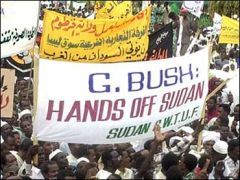Ruling party, religious leaders say UN decision targets Islam
By MOHAMED OSMAN, Associated Press Writer
KHARTOUM, Sudan, Apr 1, 2005 (AP) — Sudanese hard-liners vowed Friday to defy a U.N. Security Council resolution referring Darfur war crimes suspects to the International Criminal Court, saying it was unfair for Sudanese suspects to face The Hague tribunal when Americans are exempt.

|
|
More than 100,0000 Sudanese protesters in Khartoum, Aug 4, 2004, march to the office of the United Nations in Khartoum to protest a UN Security Council resolution. (AP). |
Sudan opposes sending any of its citizens accused of committing war crimes during the 2-year-old Darfur conflict in the country’s west to a foreign court, saying Sudan’s judicial system will take charge of any such prosecutions.
The U.N. resolution passed Thursday only after controversial concessions were made, including guarantees that citizens of countries not party to the ICC working in Sudan — including the United States — would not be handed over to the ICC or any other nation’s courts if they commit crimes in Sudan.
“We will not allow any arrest or trial of a Sudanese official, unless they will arrest the 30 million Sudanese people and try them,” Abdul Galeel Nazeer Karori, a leading Islamist and member of Sudan’s ruling National Congress party, said on state-run TV.
“This is a direct intervention in the affairs of the country, it is meant to ban the government from carrying out its mission,” he added.
During a Friday mosque prayer service in Khartoum attended by President Omar el-Bashir, hundreds of mourners chanted “Allahu akbar” or “God is great” in Arabic as a government-alligned Islamist criticized the U.N. resolution as containing “double standards.”
“No American will be tried there, but the poor and weak Sudan will be tried right or wrong, for what it did and what it didn’t do,” said Tigani Siraj, a National Congress lawmaker who led prayers during the service.
Siraj said the resolution targets not just the Sudanese government, which the United States accuses of carrying out war crimes in Darfur, but also Sudanese people and Islam. El-Bashir made no comments during the service nor spoke to reporters.
Sudan rejects claims by the United States of aiding Arab militiamen, known as the Janjaweed, in a violent campaign target African villagers throughout Darfur, a region the size of France.
An estimated 180,000 people have died in the conflict since February 2003, when two non-Arab rebel groups took up arms against the Arab-dominated government to win more political and economic rights for Darfur’s African tribes.
Thursday’s Security Council vote passed 11-0, with the United States, Algeria, China and Brazil abstaining. The American abstention marked a major policy shift for Washington. Ever since he took office, President George W. Bush had actively opposed the court.
Acting U.S. Ambassador Anne Patterson said Washington was determined to get something done on Sudan but still objected to the ICC.
Sudan’s Ambassador Elfatih Erwa noted his country’s deep opposition to the referral to the ICC, describing it as “a tool to exercise the culture of superiority and impose the culture of superiority.”
But Sudan’s former prime minister, Sadiq el-Mahdi, supported the U.N. resolution, saying el-Bashir should send suspects to the ICC.
“There were crimes committed in Darfur and there are victims. There are war crimes and crimes against humanity and they must be sent to trial,” el-Mahdi, who was toppled by el-Bashir in a 1989 coup, told Al-Jazeera TV station.
An ICC court official, speaking on condition of anonymity, has said a team of around two dozen investigators from the prosecutor’s office is ready to fly to Sudan and begin preparing cases against alleged perpetrators of severe human rights violations, and possibly genocide.
The prosecution case file will include material gathered by a special U.N. commission of inquiry, which compiled a list of 51 suspects submitted to the U.N. in January.
The resolution refers Darfur cases since July 1, 2002, to the ICC. That was the recommendation of a U.N. panel that had concluded in January that crimes against humanity — but not genocide — occurred in the vast western region of Sudan.
The document was the last of three Security Council resolutions aimed at pressuring Sudan to stop a crisis in Darfur.
One resolution strengthens the arms embargo and imposes an asset freeze and travel ban on those who defy peace efforts. The other will send 10,000 U.N. peacekeepers to monitor a peace deal between the government and southern rebels that ended a 21-year civil war. The council hopes the resolution will also help Darfur move toward peace.
